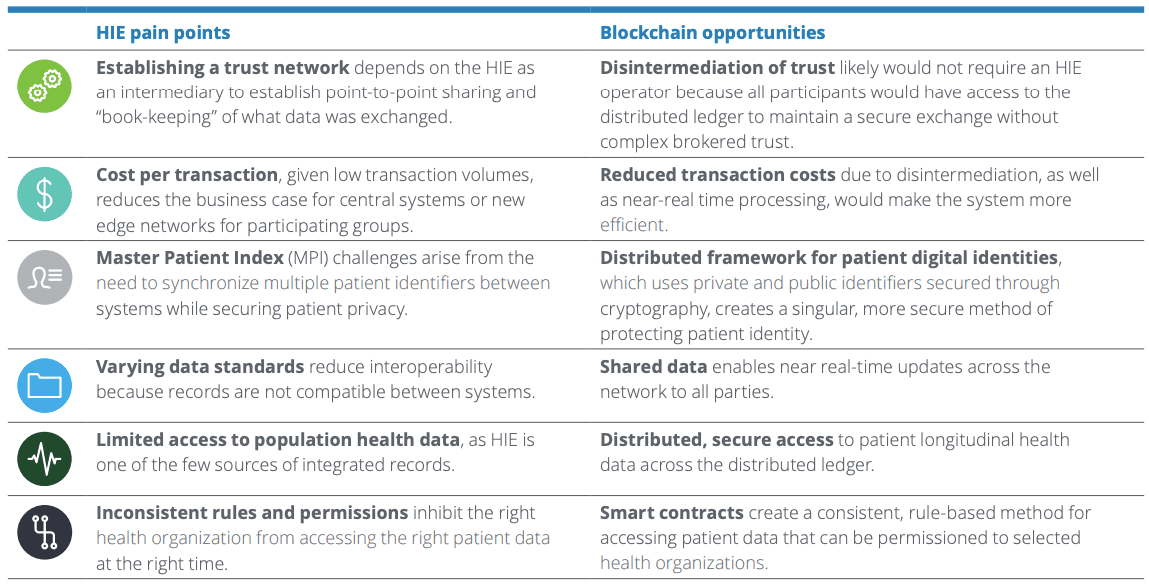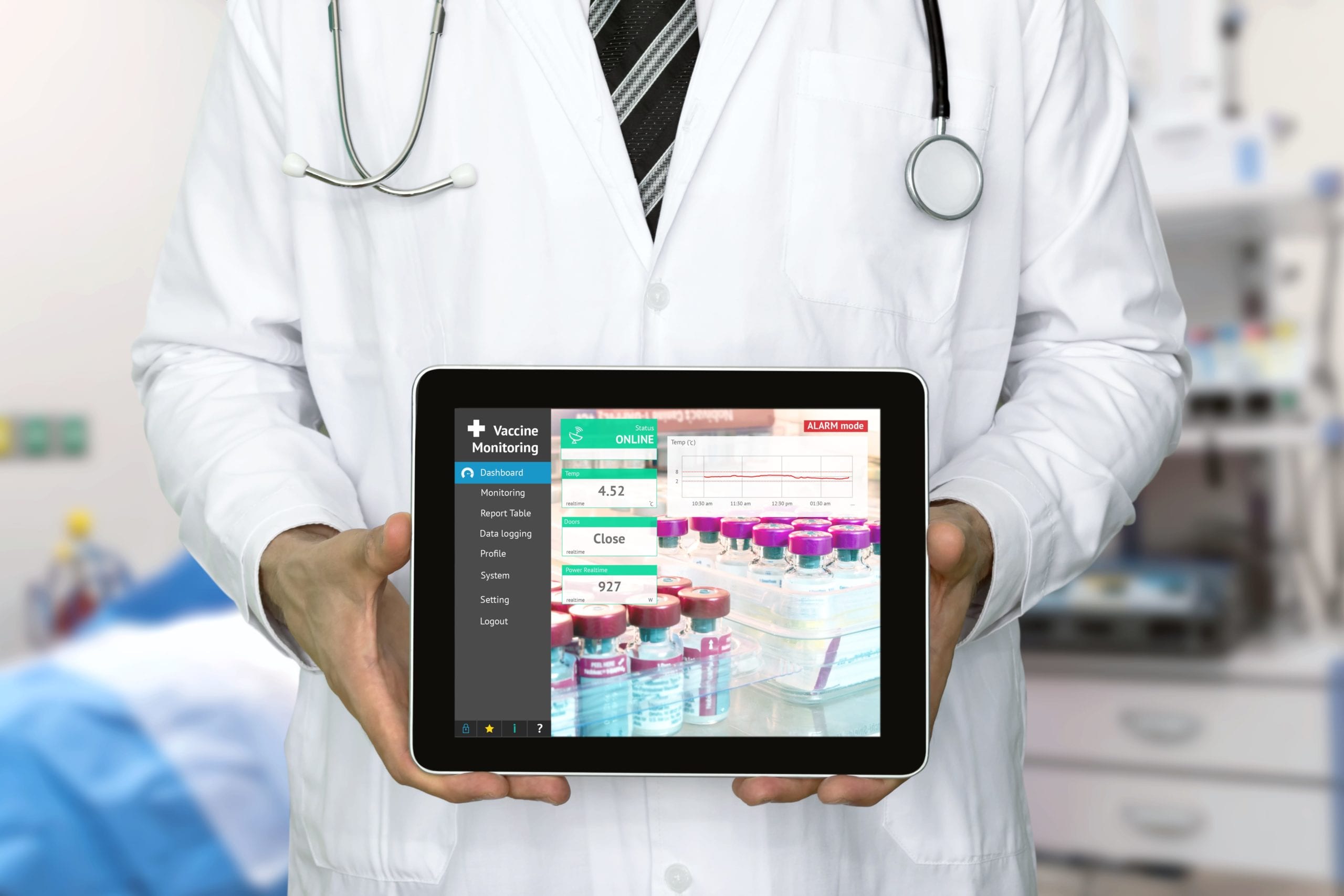Nowadays, blockchain implementation opens up a vast number of opportunities in different industries. According to McKinsey, such industry sectors as technology, media & telecom, financial area, and public sector have the highest impact of blockchain.
However, today we will focus on one of the most prospective areas for various digital improvement implementations - the healthcare industry.

In this article, we will study the peculiarities of blockchain implementation into healthcare, analyze the main challenges of this process, and the advantages you can get from it.
Blockchain — the New HIE Model
The modern healthcare industry becomes more complex and now covers the patient services and care coordination and treatment monitoring, hospital navigation & information access, remote and in-house patient monitoring, patient experience, etc. But, with the blockchain, data management becomes much more straightforward and transparent.
What Is Blockchain?
In the healthcare industry, blockchain is a system of information recording, which implies the data’s inability to be changed, hacked, or the system cheating. There are plenty of benefits you can get from blockchains implementing:
- Healthcare system transparency
- Security enhancing
- Data traceability improving
- Transactions efficiency and speed-boosting
- Investments are reducing
As you can see, all these improvements can significantly boost healthcare institutions and influence.
HIE Pain Points & Blockchain Solutions
To prove the blockchain’s efficiency, it is crucial to analyze the main issues it can resolve.

Source: Deloitte
Data Correcting
With blockchain, it becomes much easier to add or update a certain data, additionally protecting it from any change. To correct or remove data from the chain, it is needed to create a new record with correct data that supersedes the previous, or one that makes the previous record deleted. As an example, the blockchain system is used for storing transaction records or patient treatment information.
Information Exchange
The healthcare units, patients, insurers, and researchers can resolve the data exchange and availability thanks to the blockchains. Additionally, it can transform the data operating and even provide the ability to commercialize the data access.
Health Records Monitoring
The blockchain is used to identify, connect, monitor the health records, and control the access to this data. In the future, this technology will be widely developed to improve health records.
Transactions Recording
Speed up the transaction process and increase its efficiency can be easily reached with blockchains. Thus, the healthcare units can always track the data related to the funds operating and also have accurate information about each transaction made.
Blockchain as an Enabler of Nationwide Interoperability
The blockchain implementation can optimize and secure the data management so as to get the most of the medical treatment progress in various areas.
This process may be divided into four steps:
Step 1. Data Creating & Updating
Here the health institutions record the clinical data and patient’s public ID to the blockchain.
Step 2. Transaction Processing & Storage
At this stage, each change is recorded on the blockchain in the patient’s public ID (without any personal information).
Step 3. Data Query
The health organizations can ask for providing information on the blockchain and get the general data for further research. This procedure is highly required for medical issue research.

Step 4. Patient’s Data Sharing
However, it is also possible to share the private key to allow healthcare organizations and institutions to get full personal data. For this purpose, the patient can give his permission for data examination with the private key. The confidential data will remain unavailable for those who don’t have that key.
Implementation Challenges and Considerations
Now the blockchain has been widely used for traditional systems improving in different countries. Nevertheless, it is crucial for healthcare institutions, as it can significantly improve the treatment procedure and even save people’s lives. To draw an example, let’s review the real cases on how the blockchain system can resolve issues in healthcare.
Case 1. Medical Error Reducing
According to the WHO statistics, medical errors account for 6 to 17% of all cases in hospitals. And, when in low- and middle-income countries that happen because of the lack of evidence, in high and higher-income countries, it is caused by the limited access to the data, insufficient qualified primary care specialists, and paper-based record system.
With blockchains applying, you will make the first step towards the healthcare institutions digitizing and unifying.
So, the hospitals can share the big data fluently and automate the processes, thus reducing medical error. Consequently, it will greatly boost the medical service efficiency and healthcare system improvement.
Case 2. Drug Counterfeiting
This problem is crucial not only for the pharmaceutical companies' income but also for the patients who suffered or even have lost their lives because of taking counterfeit medicines.
Blockchain applications can greatly optimize the drug supply by providing relevant information about the medicine and its transaction details. Furthermore, it will help monitor the drug's availability in any healthcare institution and their certificates and quantity.
Case 3. Medical Research
Nowadays, up to 50% go unreported, and sometimes researchers don’t share their outcomes. This results in the data gap for the requisitioners and can be harmful to patients’ health.
However, by sharing & updating the patients’ treatment results (with their consent), the blockchain recording can benefit the medical research process. That means more fruitful cooperation between the patients and researchers and more correct research data results.
Shaping the Blockchain Future
It goes without saying that blockchains have a great impact on healthcare structure optimization. The various improvements can be noticed with data managing and operating, transactions processing, health records monitoring, etc.
So, the healthcare units upgrade the traditional process performing into a more efficient, distributed worldwide system.
Intellectsoft is always here to help you and your corporation with any complex process optimization and upgrading.
If you are looking for the best option for your business improvement, contact us. Our experts will definitely do detailed research about the topic and provide you with the most beneficial options for your business.